Boiler Installation Drayton
Top Boiler Replacement in Drayton
Receive 3 FREE Boiler Installation quotes for your project today! Compare profiles, reviews, accreditations, portfolio, etc... and choose the best deal.
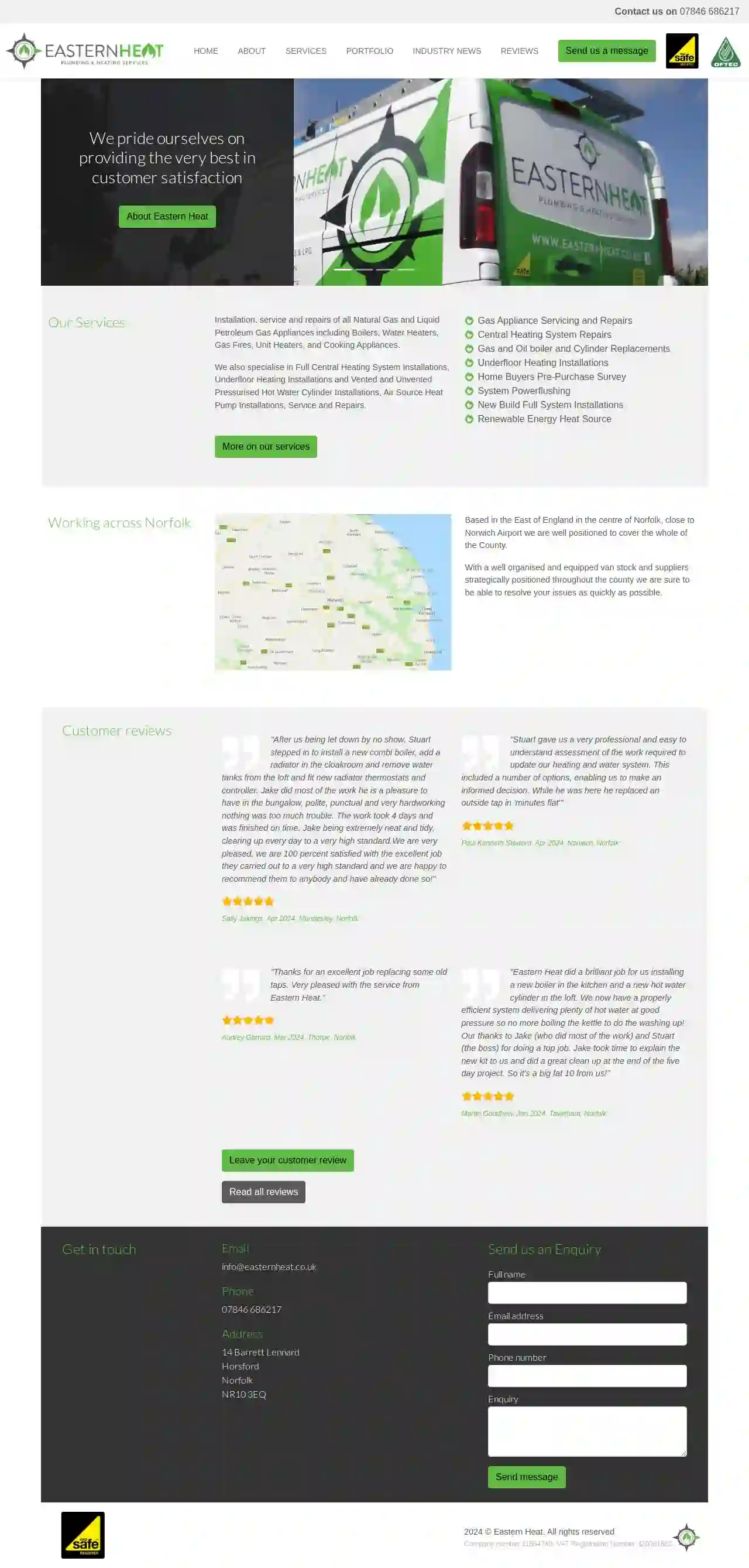
Eastern Heat Limited
541 reviews14 Barrett Lennard, Horsford, NR10 3EQ, GBWe pride ourselves on providing the very best in customer satisfaction. About Eastern Heat, Installation, service and repairs. We work with all Natural Gas and Liquid Petroleum Gas Appliances including Boilers, Water Heaters, Gas Fires, Unit Heaters, and Cooking Appliances. We also specialise in Full Central Heating System Installations, Underfloor Heating Installations and Vented and Unvented Pressurised Hot Water Installations, Service and Repairs. See all services. Home Buyers Report. Are you looking to purchase your dream home but would like peace of mind that the boiler and heating system in this new property is up to scratch? Then Eastern Heat offer a Home Buyers Report service. Our home buyers report. Peace of mind. Offering a Generous 12 year parts and labour warranties with Which? Best buy boiler for the last 3 years running. Eastern Heat are proud to be Viessmann Trained Installers. This means you will have a 12 year peace of mind, no cost, warranty period following the installation of your new boiler. See our Portfolio. Our Services. Installation, service and repairs of all Natural Gas and Liquid Petroleum Gas Appliances including Boilers, Water Heaters, Gas Fires, Unit Heaters, and Cooking Appliances. We also specialise in Full Central Heating System Installations, Underfloor Heating Installations and Vented and Unvented Pressurised Hot Water Cylinder Installations, Air Source Heat Pump Installations, Service and Repairs. Gas Appliance Servicing and Repairs. Central Heating System Repairs. Gas and Oil boiler and Cylinder Replacements. Underfloor Heating Installations. Home Buyers Pre-Purchase Survey. System Powerflushing. New Build Full System Installations. Renewable Energy Heat Source.
- Services
- Why Us?
- Accreditations
- Our Team
- Testimonials
- Gallery
Get Quote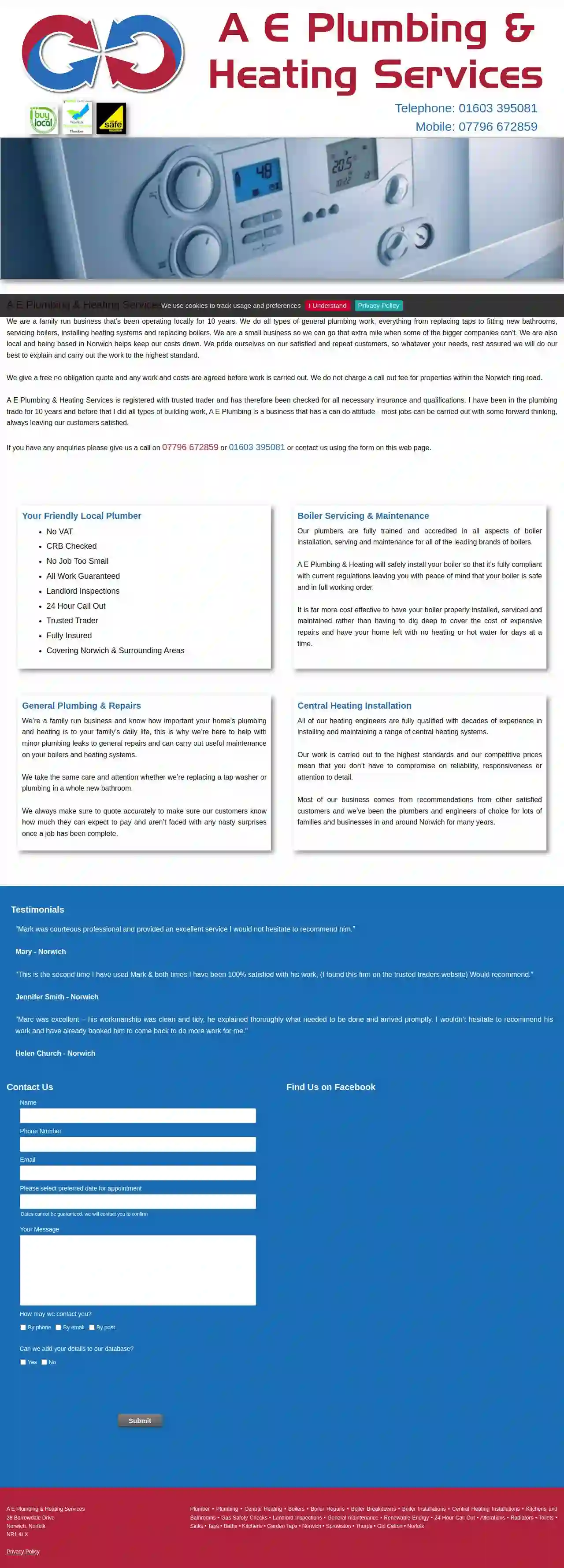
A E Plumbing & Heating Services
3.54 reviews28 Borrowdale Drive, Norwich, NR1 4LX, GBA E Plumbing & Heating Services is a family run business that has been operating locally for 10 years. We undertake all types of general plumbing work, from replacing taps to fitting new bathrooms, servicing boilers, installing heating systems and replacing boilers. As a small business, we pride ourselves on going the extra mile for our customers, something that larger companies sometimes struggle to do. Being based in Norwich helps us keep our costs down, and we are committed to providing a high standard of work at competitive prices. We always aim to explain things clearly to our customers and ensure they are happy with the work carried out. We offer free, no obligation quotes and all work and costs are agreed upon before any work commences. We do not charge a call out fee for properties within the Norwich ring road. A E Plumbing & Heating Services is registered with Trusted Trader, meaning we have been checked for all necessary insurance and qualifications. The owner has 10 years of experience in the plumbing trade and previously worked in all types of building work. A E Plumbing is a business with a 'can do' attitude, finding solutions to most jobs with some forward thinking, always leaving our customers satisfied.
- Services
- Why Us?
- Accreditations
- Gallery
Get Quote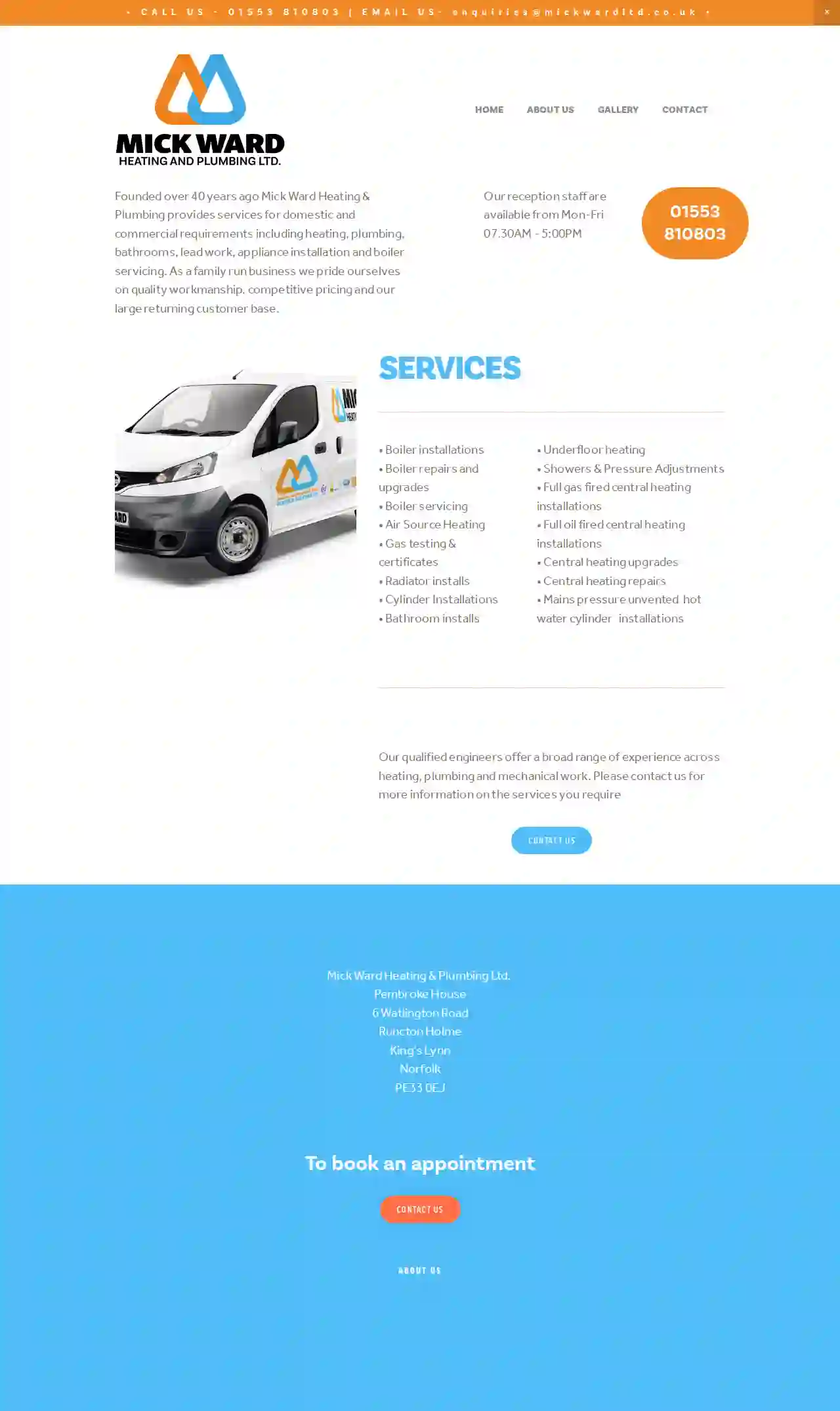
Mick Ward Plumbing & Heating Ltd
44 reviews6 Watlington Road, Pembroke House, Runcton Holme, PE33 0EJ, GBFounded over 40 years ago Mick Ward Heating & Plumbing provides services for domestic and commercial requirements including heating, plumbing, bathrooms, lead work, appliance installation and boiler servicing. As a family run business we pride ourselves on quality workmanship, competitive pricing and our large returning customer base. Our reception staff are available from Mon-Fri 07.30AM - 5:00PM
- Services
- Why Us?
- Gallery
Get Quote
King's Lynn {Plumbers} Dual Flame
51 reviewsKings Lynn, Unit 1, 14-16, High Street, PE30 1AH, GBWelcome to Kings Lynn Emergency Plumbers & Dual Flame, your trusted local plumbers in Kings Lynn and surrounding areas. With over 15 years of experience, we provide a 24/7 emergency plumbing service, ensuring that your plumbing issues are resolved quickly and efficiently. Our team of expert plumbers are fully accredited and insured, providing you with peace of mind that your property is in good hands. We offer a wide range of services, including boiler installations, repairs, and maintenance, as well as drain unblocking and CCTV surveys. Our mission is to provide exceptional customer service, ensuring that our customers are satisfied with our work and would recommend us to others. We are proud to be a family-run business, with a strong commitment to our community and the environment. At Kings Lynn Emergency Plumbers & Dual Flame, we understand the importance of having a reliable and trustworthy plumber, which is why we strive to deliver the highest level of service to our customers.
- Services
- Why Us?
Get Quote
M&R Heating and cooling Ltd
The Business Centre, 1000 Chester Road, Unit 10, Birmingham, B37 7AA, GBMr Heating & Cooling is a family-run business with over 20 years of experience in the heating and cooling industry. We pride ourselves on providing high-quality, reliable service at competitive prices. Our team of qualified engineers is dedicated to ensuring your complete satisfaction. We offer a wide range of services, including boiler installations, repairs, and servicing, as well as air conditioning installation and maintenance. We also offer a 24/7 emergency call-out service. At Mr Heating & Cooling, we understand that your home comfort is important to you. That's why we are committed to providing you with the best possible service. We use only the highest quality parts and materials, and our engineers are fully trained and experienced. We are also Gas Safe registered, so you can be assured that you are in safe hands. We serve customers throughout the local area, and we are always happy to provide a free, no-obligation quote. Contact us today to learn more about our services.
- Services
- Why Us?
Get Quote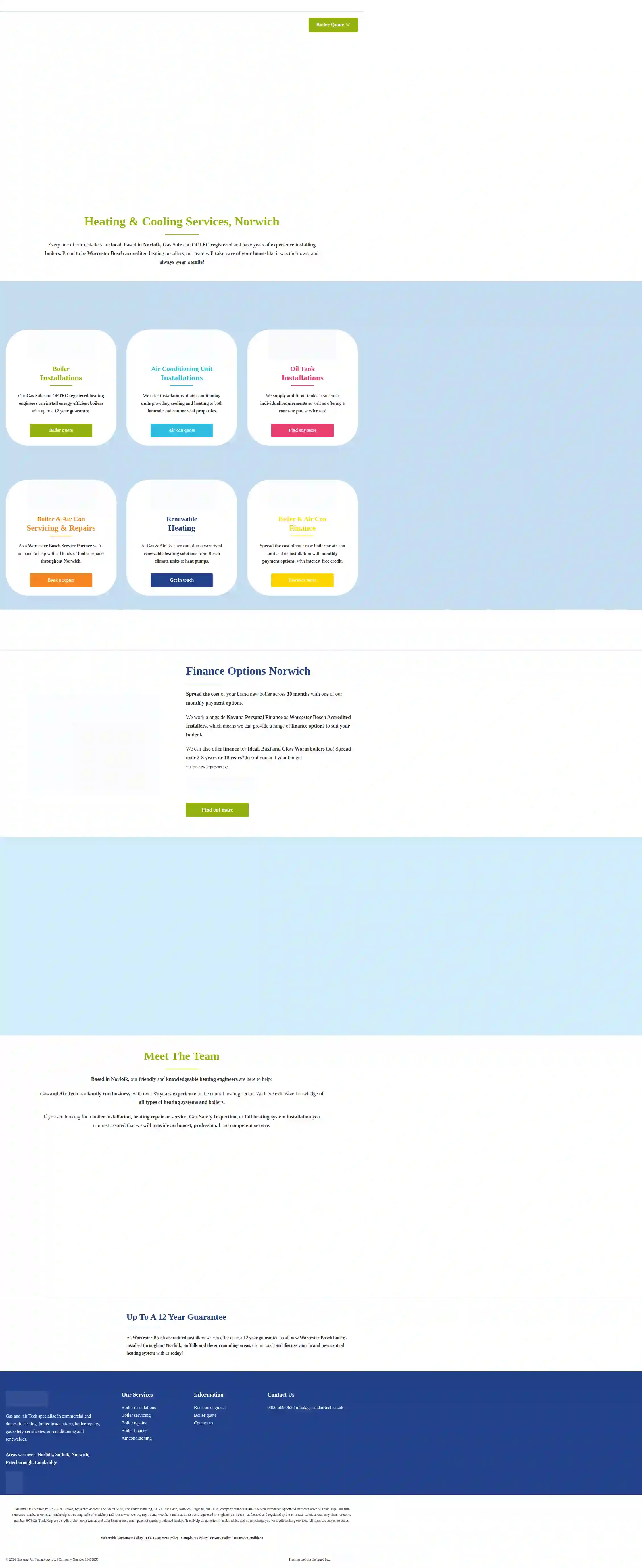
Gas & Air Technology Ltd
4.539 reviewsNorwich, GBGas and Air Tech is a family-run business based in Norfolk with over 35 years of experience in the central heating sector. We are a team of friendly and knowledgeable heating engineers who provide a range of services, including boiler installations, boiler servicing, boiler repairs, gas safety certificates, air conditioning, and renewables. We are Worcester Bosch accredited installers and can offer up to a 12-year guarantee on all new Worcester Bosch boilers. We pride ourselves on providing an honest, professional, and competent service to all our customers.
- Services
- Why Us?
- Accreditations
- Testimonials
- Gallery
Get Quote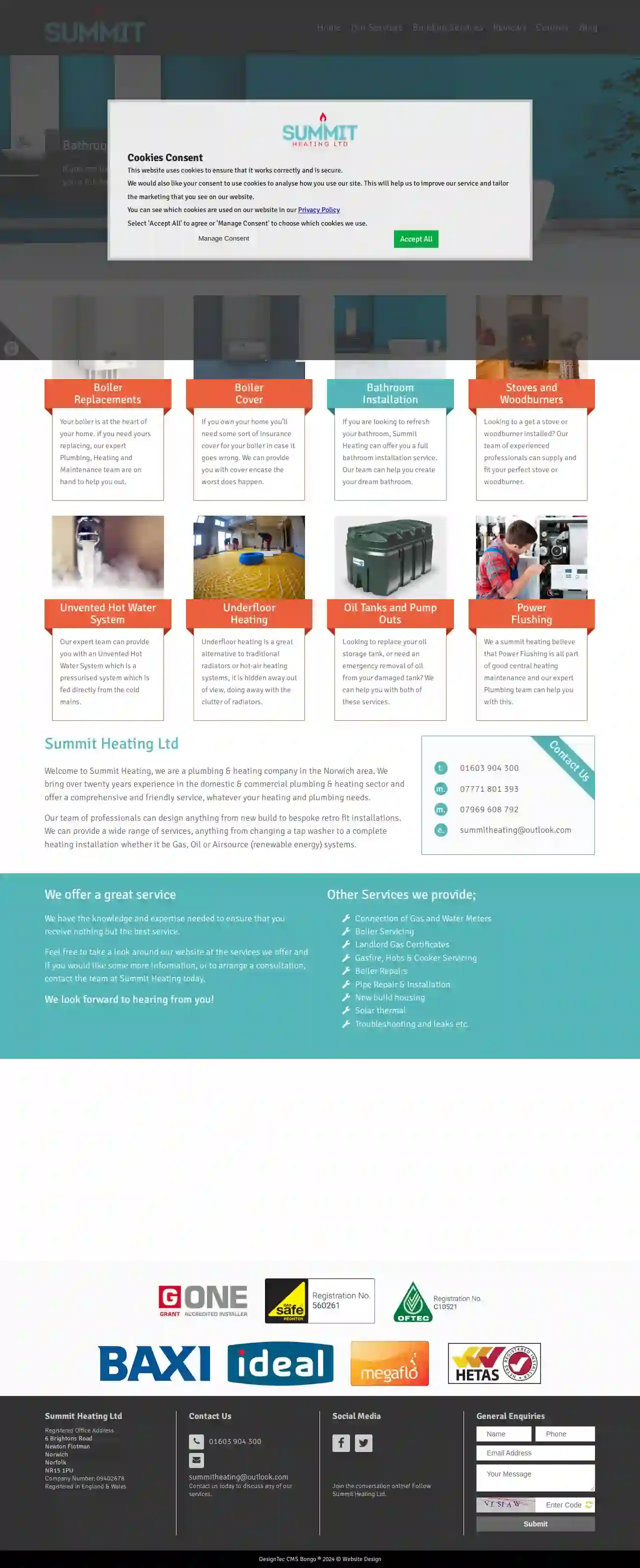
Summit Heating Ltd
4.918 reviews6 Brightons Road, Newton Flotman, NR15 1PU, GBWelcome to Summit Heating, we are a plumbing & heating company in the Norwich area. We bring over twenty years experience in the domestic & commercial plumbing & heating sector and offer a comprehensive and friendly service, whatever your heating and plumbing needs.Our team of professionals can design anything from new build to bespoke retro fit installations. We can provide a wide range of services, anything from changing a tap washer to a complete heating installation whether it be Gas, Oil or Airsource (renewable energy) systems.
- Services
- Why Us?
- Accreditations
- Our Team
- Testimonials
- Gallery
Get Quote
South Shore Heating & Cooling
4.9850 reviews57 White's Path, South Yarmouth, 02664, GBSouth Shore Heating & Cooling builds lasting relationships by treating customers the way we like to be treated ourselves. As our customer, you can count on: Competitive pricing that is consistent for new and existing customers alike, Advanced energy conservation that integrates clean, renewable energy, Service and installation by certified heating and cooling experts. Whether you're already our valued customer or you're visiting for the first time, take a look at the products, services and special offers you'll find on this website—then contact us at 508-398-6901. If you're new to South Shore Heating & Cooling, we hope you join our family of satisfied customers! We look forward to serving you with the same warm, personal attention we have continued to give our customers since 1959.
- Services
- Why Us?
- Accreditations
- Testimonials
- Gallery
Get Quote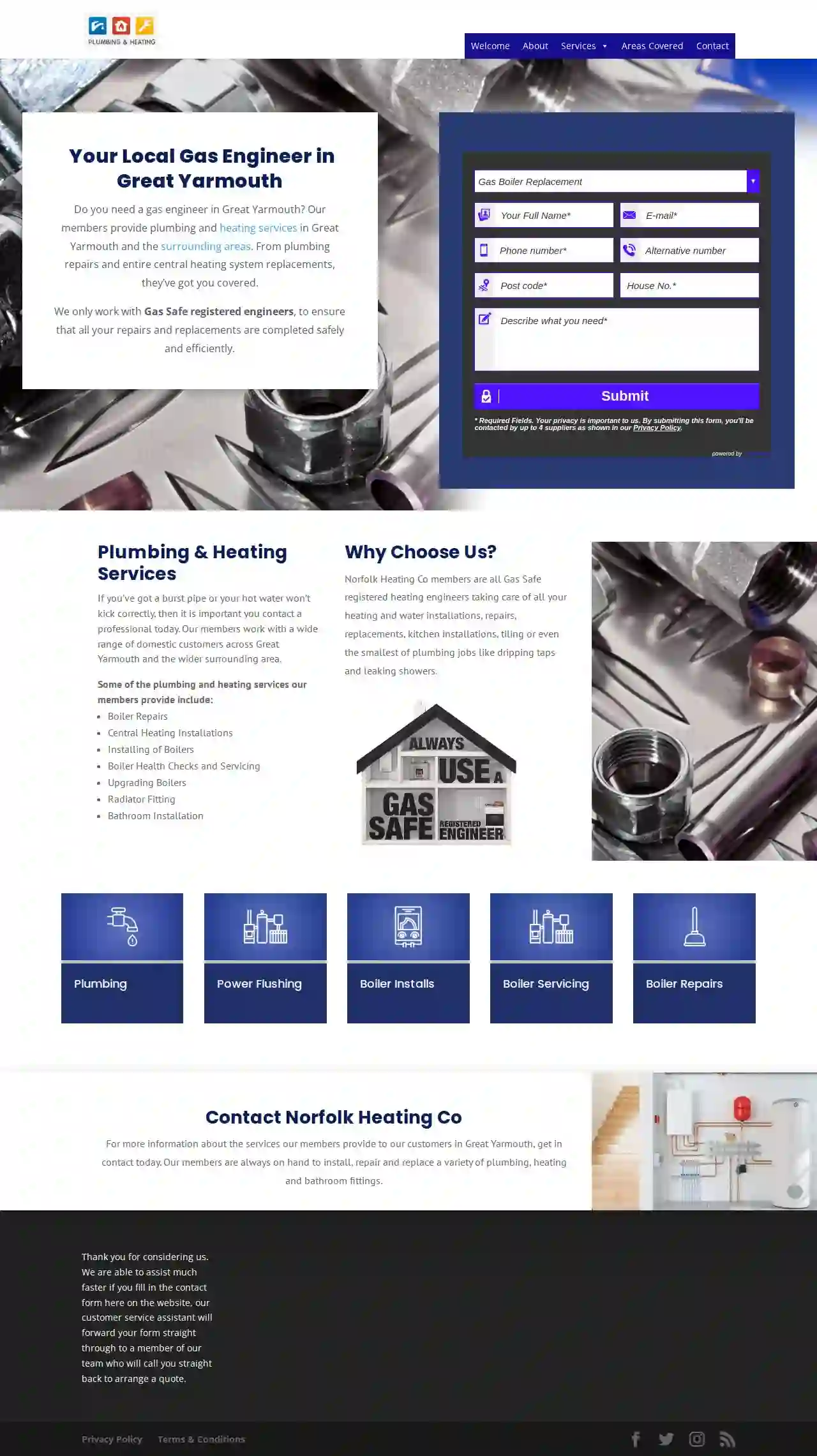
P.R.Drew & sons
Great Yarmouth, GBNorfolk Heating Co is a network of Gas Safe registered heating engineers serving Norfolk and the surrounding areas. They offer a comprehensive range of plumbing and heating services, from boiler installations and repairs to central heating system replacements and bathroom installations. Their team of experienced engineers ensures all work is completed safely and efficiently. Whether you need a small repair like fixing a dripping tap or a complete system overhaul, Norfolk Heating Co is committed to providing reliable and professional service to domestic customers across the region.
- Services
- Why Us?
- Gallery
Get Quote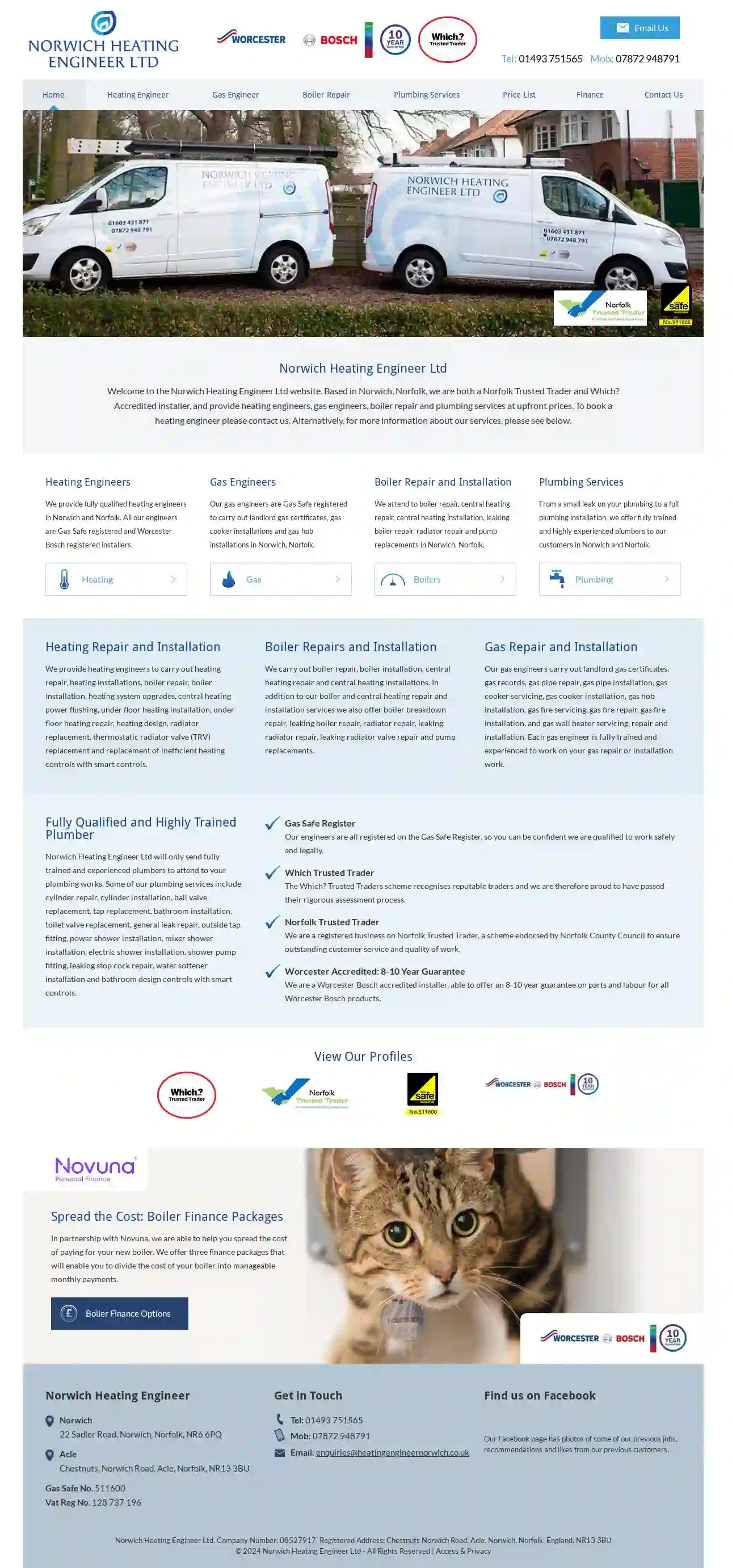
Norwich Heating Engineer Ltd
4.619 reviews22 Sadler Road, Norwich, NR6 6PQ, GBNorwich Heating Engineer Ltd is a trusted heating, gas, and plumbing service provider based in Norwich, Norfolk. We are proud to be both a Norfolk Trusted Trader and Which? Accredited installer, ensuring our customers receive high-quality workmanship and reliable service. Our team of fully qualified and Gas Safe registered engineers are experts in a wide range of services, including boiler repair and installation, central heating repair and installation, gas cooker and hob installations, landlord gas certificates, and general plumbing services. We are committed to providing upfront pricing and transparent communication, so you can be confident in the cost of your repairs or installations. We also offer Worcester Bosch accredited installations, backed by an 8-10 year guarantee on parts and labour. For your peace of mind, we are a Which? Trusted Trader and a Norfolk Trusted Trader, demonstrating our commitment to customer satisfaction and quality work.
- Services
- Why Us?
- Accreditations
- Gallery
Get Quote
Over 12,692+ HVAC Contractors in our network
Our HVAC pros operate in Drayton & surroundings!
HVACCompaniesHub has curated and vetted the Best HVAC Businesses in Drayton. Find the most reliable contractor today.
Frequently Asked Questions About Boiler Installation
- Combi Boilers (Combination Boilers): Most common and provide both heating and hot water instantly , They are compact and ideal for smaller spaces. They may struggle to meet high hot water demand for larger households.
- Regular Boilers (Conventional, Heat-Only Boilers): These boilers require both a cold water storage tank (usually in the loft) and a hot water cylinder (usually in an airing cupboard), taking up more space. They deliver a consistent supply of hot water but are usually less energy-efficient than newer boiler types.
- System Boilers: They have components built in, reducing installation time and complexity. They are generally a good middle ground between other options. Homes with two or more bathrooms benefit from this type of system.
- Condensing Boilers: Highly efficient units that improve energy efficiency by reusing heat from the flue gases. They're better for the environment and can save you money in the long run.
How do I find a Gas Safe registered engineer?
How do I turn off my boiler?
How long does it take to install a boiler?
What are the different types of boilers?
How do I find a Gas Safe registered engineer?
How do I turn off my boiler?
How long does it take to install a boiler?
What are the different types of boilers?
- Combi Boilers (Combination Boilers): Most common and provide both heating and hot water on demand, They are compact and ideal for smaller spaces. They may struggle to meet high hot water demand for larger households.
- Regular Boilers (Conventional, Heat-Only Boilers): More complex systems that involve both a storage tank and a hot water cylinder. If you have multiple bathrooms or high hot water demand, then this is a good choice.
- System Boilers: These boilers heat your central heating directly and also store hot water in a cylinder. They are generally a good middle ground between other options. Homes with two or more bathrooms benefit from this type of system.
- Condensing Boilers: Highly efficient units that improve energy efficiency by reusing heat from the flue gases. These are more expensive initially but reduce energy consumption and operating costs.